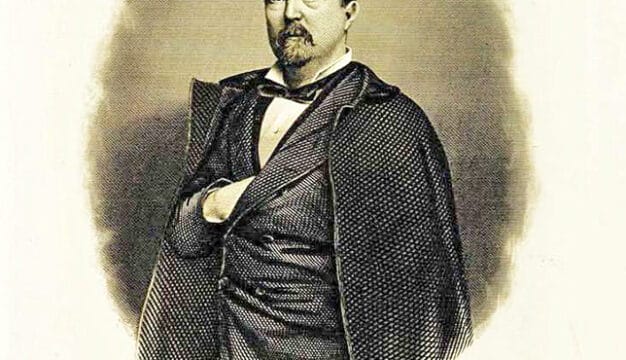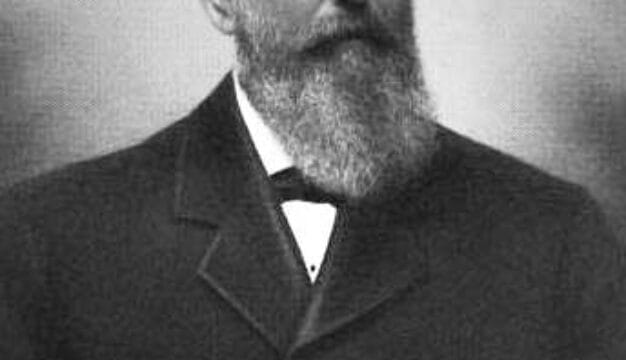Robert Graetz
Robert Sylvester Graetz, Jr. (1928-2020) was best known as a participant and leader in the Montgomery Bus Boycott. A member of the Lutheran clergy, he was the only white clergy member in Montgomery to participate in this landmark event.
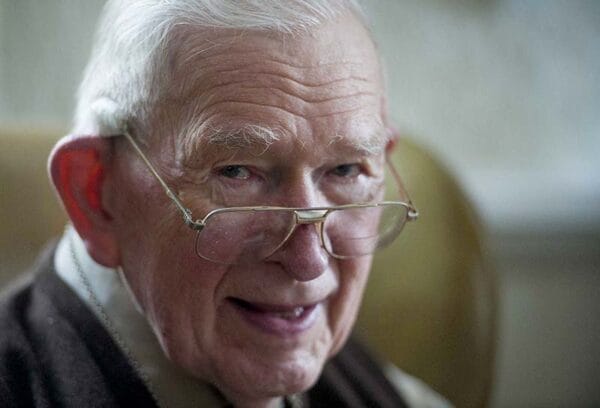 Robert Graetz
Robert Graetz was born May 16, 1928, in Clarksburg, West Virginia, to Robert Sylvester Graetz and Maxine Fuller Graetz and was one of two children. His father was an engineer with the glass manufacturer Libbey-Owens-Ford Company. Graetz was inspired to become a member of the Lutheran clergy by his paternal grandfather, a Midwesterner of German ancestry who was a Lutheran clergyman. He attended Capital University in Bexley, Ohio, and graduated in 1950. While at Capital, Graetz helped organize a campus race-relations club that invited Walter White, then president of the National Association for the Advancement of Colored People (NAACP), to speak during a campus visit. After graduation, Graetz enrolled in the Trinity Lutheran Seminary in Columbus, Ohio, as part of his continuing aspirations to become a Lutheran clergy member. On June 10, 1951, Graetz married Jeanne Ellis in Springfield, Pennsylvania, starting a family that would eventually include seven children. From 1952-1954, he served as the student pastor for Community Lutheran Church in Los Angeles, California. Graetz graduated from Trinity Lutheran Seminary in 1955, receiving a bachelor of divinity degree.
Robert Graetz
Robert Graetz was born May 16, 1928, in Clarksburg, West Virginia, to Robert Sylvester Graetz and Maxine Fuller Graetz and was one of two children. His father was an engineer with the glass manufacturer Libbey-Owens-Ford Company. Graetz was inspired to become a member of the Lutheran clergy by his paternal grandfather, a Midwesterner of German ancestry who was a Lutheran clergyman. He attended Capital University in Bexley, Ohio, and graduated in 1950. While at Capital, Graetz helped organize a campus race-relations club that invited Walter White, then president of the National Association for the Advancement of Colored People (NAACP), to speak during a campus visit. After graduation, Graetz enrolled in the Trinity Lutheran Seminary in Columbus, Ohio, as part of his continuing aspirations to become a Lutheran clergy member. On June 10, 1951, Graetz married Jeanne Ellis in Springfield, Pennsylvania, starting a family that would eventually include seven children. From 1952-1954, he served as the student pastor for Community Lutheran Church in Los Angeles, California. Graetz graduated from Trinity Lutheran Seminary in 1955, receiving a bachelor of divinity degree.
Upon his graduation from seminary, the Lutheran Church asked Graetz to take a post in a primarily African American church because of a shortage of black Lutheran ministers in the southeast. In June 1955, he joined Trinity Lutheran Evangelical Church in Montgomery, Montgomery County, as their pastor, though he frequently preached at churches in nearby Wetumpka, Elmore County, and Clanton, Chilton County.
During his tenure in Montgomery, Graetz was an active participant and leader in the Montgomery Bus Boycott, which began in December 1955. Graetz used his position as pastor to ask his congregants to support the boycott and not ride on Montgomery’s public transportation. As a member and leader in the Montgomery Improvement Association (MIA), which supported the boycott, he helped transport people from home to work in the mornings, organized carpools, and raised money to pay for the gas and other car expenses for other drivers who were participating in the carpools. In particular, Graetz wrote other white clergy members in Montgomery to ask that they also publicly support the boycott and to speak with Martin Luther King Jr. about supporting the boycott. But the association representing the white clergy in Montgomery refused to speak with King.
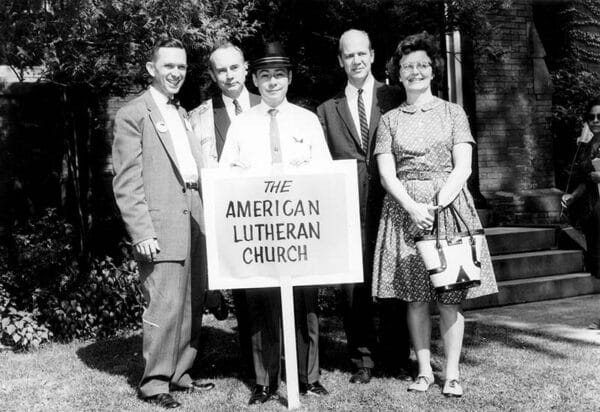 Robert Graetz and Lutheran Activists
Because of his support of the Montgomery Bus Boycott, Graetz and his family were shunned by much of Montgomery’s white society and received threatening notices from anonymous sources. On December 12, 1955, Graetz was targeted by Montgomery law enforcement while participating in a carpool. He was stopped by Montgomery sheriff Mac Sim Butler and accused of picking up passengers in a taxi zone. Butler ordered Graetz to follow him to the county jail, where the deputy sheriff tried to warn Graetz away from continuing to support the boycott. In August 1956, Graetz’s Montgomery home was bombed while he and his family were with Rosa Parks at an event at the Highlander Folk School in Tennessee. None of his family was injured, and Montgomery mayor William A. Gayle accused the MIA of setting the bomb to garner public support for their cause. After the boycott ended and Montgomery public transportation was desegregated, Graetz’s home was bombed again on January 10, 1957. Rev. Ralph Abernathy‘s home was also targeted that night, and no one was ever convicted for these violent acts.
Robert Graetz and Lutheran Activists
Because of his support of the Montgomery Bus Boycott, Graetz and his family were shunned by much of Montgomery’s white society and received threatening notices from anonymous sources. On December 12, 1955, Graetz was targeted by Montgomery law enforcement while participating in a carpool. He was stopped by Montgomery sheriff Mac Sim Butler and accused of picking up passengers in a taxi zone. Butler ordered Graetz to follow him to the county jail, where the deputy sheriff tried to warn Graetz away from continuing to support the boycott. In August 1956, Graetz’s Montgomery home was bombed while he and his family were with Rosa Parks at an event at the Highlander Folk School in Tennessee. None of his family was injured, and Montgomery mayor William A. Gayle accused the MIA of setting the bomb to garner public support for their cause. After the boycott ended and Montgomery public transportation was desegregated, Graetz’s home was bombed again on January 10, 1957. Rev. Ralph Abernathy‘s home was also targeted that night, and no one was ever convicted for these violent acts.
In 1958, Graetz and his family returned to Columbus, Ohio, where he served as a minister at the primarily African American St. Philips Lutheran Church until 1967. He then moved to Washington, D.C., where he served as a minister for Lutheran Mission 373, an experimental community ministry, and continued as an activist and lobbyist for marginalized peoples. In 1970, the Graetz family returned once again to Columbus, Ohio, so Graetz could take a position on the Ohio Council of Churches, a position he occupied until 1983. That year, Graetz became a part-time minister at St. John Lutheran in Logan, Ohio. On October 31, 1995, Robert Graetz retired from full-time ministry, though he continued to hold various interim ministerial positions in Ohio.
In 2007, Robert and Jeanne Graetz returned to Montgomery and became involved with the diversity group One Montgomery as well as the League of Women Voters, participating in their various civic functions. The Graetz family hosted the annual Graetz Symposium at Alabama State University‘s National Center for the Study of Civil Rights and African American Culture as part of their continued commitment to civil rights and racial justice.
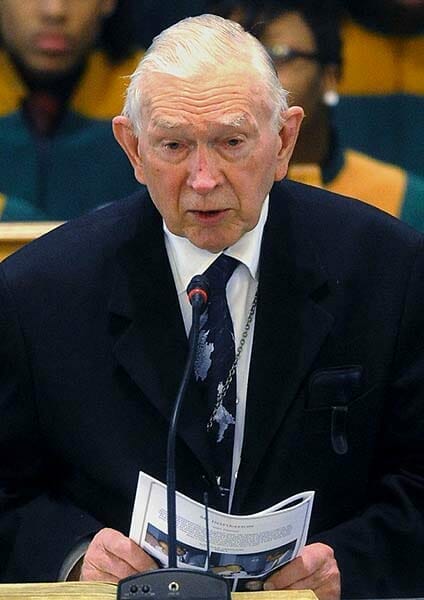 Robert Graetz in Montgomery
Graetz was the recipient of many awards throughout his life. He was named a pastor emeritus at both St. Philips Lutheran Church in Columbus, Ohio, and St. John Lutheran Church in Logan, Ohio, upon his retirement from ministry. In 1957, he received the Russwurm Award (named for the antebellum newspaper publisher and abolitionist) from the National Negro Newspaper Publishers Association. In 1976, he was honored for his participation in the Montgomery Bus Boycott by the producers and cast of Selma, a theatrical production about Martin Luther King Jr.’s activism. Graetz’s alma mater, Trinity Lutheran Seminary, named him a Distinguished Alumnus in 1986, and in 1990, Capital University awarded him an honorary doctorate of humanities. In 1993, Graetz received the Ohio Humanitarian Award during that year’s MLK Day celebration, and in 1997, he received the Ohio Governor’s Humanitarian Award during the annual MLK Day festivities.
Robert Graetz in Montgomery
Graetz was the recipient of many awards throughout his life. He was named a pastor emeritus at both St. Philips Lutheran Church in Columbus, Ohio, and St. John Lutheran Church in Logan, Ohio, upon his retirement from ministry. In 1957, he received the Russwurm Award (named for the antebellum newspaper publisher and abolitionist) from the National Negro Newspaper Publishers Association. In 1976, he was honored for his participation in the Montgomery Bus Boycott by the producers and cast of Selma, a theatrical production about Martin Luther King Jr.’s activism. Graetz’s alma mater, Trinity Lutheran Seminary, named him a Distinguished Alumnus in 1986, and in 1990, Capital University awarded him an honorary doctorate of humanities. In 1993, Graetz received the Ohio Humanitarian Award during that year’s MLK Day celebration, and in 1997, he received the Ohio Governor’s Humanitarian Award during the annual MLK Day festivities.
Graetz published several books and articles throughout his lifetime. In 1964, he published A Congregational Guide to Human Relations as well as “An Informed Church Serves a Diverse Society,” a chapter in L. W. Halverson’s The Church in a Diverse Society. Between 1973 and 1987, Graetz was also a monthly columnist for the Catholic Times, a publication of the Diocese of Columbus, Ohio. In 1991, he published Montgomery: A White Preacher’s Memoir, which was about his experiences during the Montgomery Bus Boycott. This work was republished in 1999 as A White Preacher’s Memoir: The Montgomery Bus Boycott. His final publication in 2006 was A White Preacher’s Message on Race and Reconciliation. Graetz died in his Montgomery home on September 20, 2020. He had been receiving hospice care for Parkinson’s disease. On May 21, 2021, the Alabama Historical Association unveiled a historical marker honoring the couple in front of their home at 1558 Dunbar Street.
Additional Resources
Graetz, Robert. A White Preacher’s Memoir: The Montgomery Bus Boycott. Montgomery, Ala.: Black Belt Press, 1999.
———. A White Preacher’s Message on Race And Reconciliation: Based on His Experiences Beginning With the Montgomery Bus Boycott. Montgomery, Ala.: New South Books, 2006.

